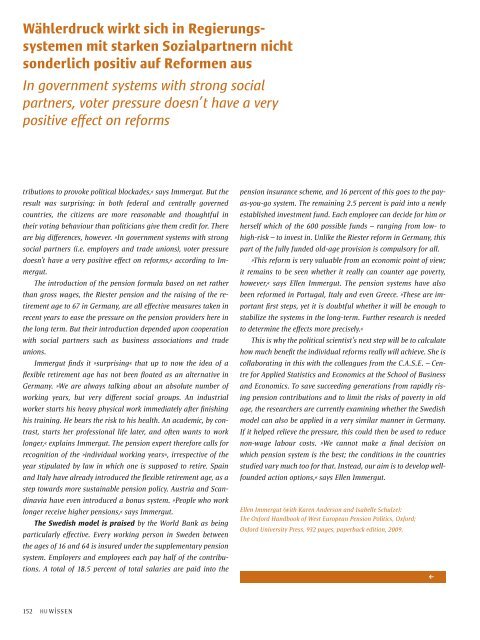hu wissen (pdf) - Exzellenzinitiative - Humboldt-Universität zu Berlin
hu wissen (pdf) - Exzellenzinitiative - Humboldt-Universität zu Berlin
hu wissen (pdf) - Exzellenzinitiative - Humboldt-Universität zu Berlin
Sie wollen auch ein ePaper? Erhöhen Sie die Reichweite Ihrer Titel.
YUMPU macht aus Druck-PDFs automatisch weboptimierte ePaper, die Google liebt.
Wählerdruck wirkt sich in Regierungssystemen<br />
mit starken Sozialpartnern nicht<br />
sonderlich positiv auf Reformen aus<br />
In government systems with strong social<br />
partners, voter pressure doesn’t have a very<br />
positive eff ect on reforms<br />
tributions to provoke political blockades,« says Immergut. But the<br />
result was surprising: in both federal and centrally governed<br />
countries, the citizens are more reasonable and thoughtful in<br />
their voting behaviour than politicians give them credit for. There<br />
are big diff erences, however. »In government systems with strong<br />
social partners (i.e. employers and trade unions), voter pressure<br />
doesn’t have a very positive eff ect on reforms,« according to Immergut.<br />
The introduction of the pension formula based on net rather<br />
than gross wages, the Riester pension and the raising of the retirement<br />
age to 67 in Germany, are all eff ective measures taken in<br />
recent years to ease the pressure on the pension providers here in<br />
the long term. But their introduction depended upon cooperation<br />
with social partners such as business associations and trade<br />
unions.<br />
Immergut fi nds it »surprising« that up to now the idea of a<br />
fl exible retirement age has not been fl oated as an alternative in<br />
Germany. »We are always talking about an absolute number of<br />
working years, but very diff erent social groups. An industrial<br />
worker starts his heavy physical work immediately a� er fi nishing<br />
his training. He bears the risk to his health. An academic, by contrast,<br />
starts her professional life later, and o� en wants to work<br />
longer,« explains Immergut. The pension expert therefore calls for<br />
recognition of the »individual working years«, irrespective of the<br />
year stipulated by law in which one is supposed to retire. Spain<br />
and Italy have already introduced the fl exible retirement age, as a<br />
step towards more sustainable pension policy. Austria and Scandinavia<br />
have even introduced a bonus system. »People who work<br />
longer receive higher pensions,« says Immergut.<br />
The Swedish model is praised by the World Bank as being<br />
particularly eff ective. Every working person in Sweden between<br />
the ages of 16 and 64 is insured under the supplementary pension<br />
system. Employers and employees each pay half of the contributions.<br />
A total of 18.5 percent of total salaries are paid into the<br />
152<br />
pension insurance scheme, and 16 percent of this goes to the payas-you-go<br />
system. The remaining 2.5 percent is paid into a newly<br />
established investment fund. Each employee can decide for him or<br />
herself which of the 600 possible funds – ranging from low- to<br />
high-risk – to invest in. Unlike the Riester reform in Germany, this<br />
part of the fully funded old-age provision is compulsory for all.<br />
»This reform is very valuable from an economic point of view;<br />
it remains to be seen whether it really can counter age poverty,<br />
however,« says Ellen Immergut. The pension systems have also<br />
been reformed in Portugal, Italy and even Greece. »These are important<br />
fi rst steps, yet it is doubtful whether it will be enough to<br />
stabilize the systems in the long-term. Further research is needed<br />
to determine the eff ects more precisely.«<br />
This is why the political scientist’s next step will be to calculate<br />
how much benefi t the individual reforms really will achieve. She is<br />
collaborating in this with the colleagues from the C.A.S.E. – Centre<br />
for Applied Statistics and Economics at the School of Business<br />
and Economics. To save succeeding generations from rapidly rising<br />
pension contributions and to limit the risks of poverty in old<br />
age, the researchers are currently examining whether the Swedish<br />
model can also be applied in a very similar manner in Germany.<br />
If it helped relieve the pressure, this could then be used to reduce<br />
non-wage labour costs. »We cannot make a fi nal decision on<br />
which pension system is the best; the conditions in the countries<br />
studied vary much too for that. Instead, our aim is to develop wellfounded<br />
action options,« says Ellen Immergut.<br />
Ellen Immergut (with Karen Anderson and Isabelle Sc<strong>hu</strong>lze):<br />
The Oxford Handbook of West European Pension Politics, Oxford;<br />
Oxford University Press, 932 pages, paperback edition, 2009.<br />
v



